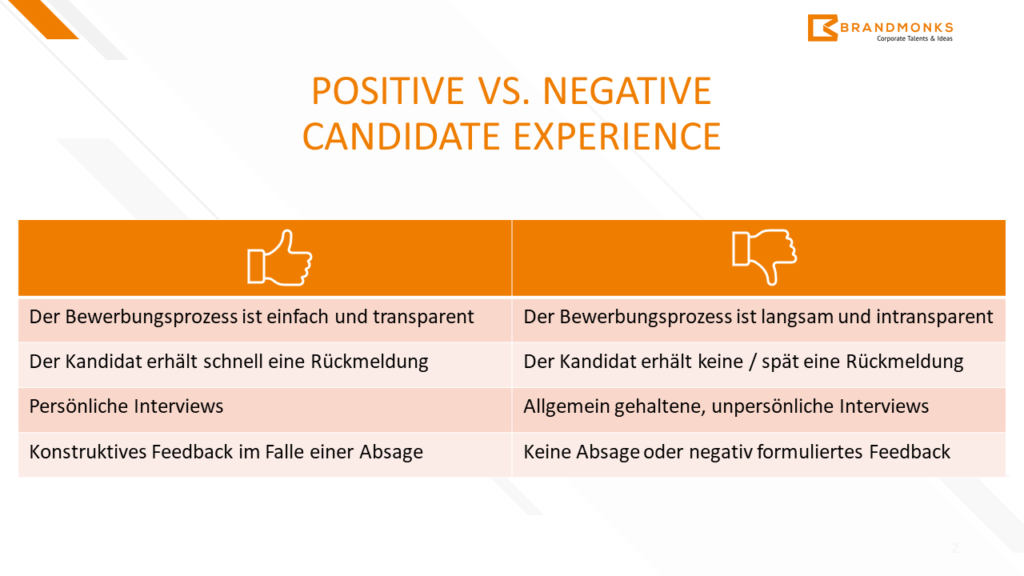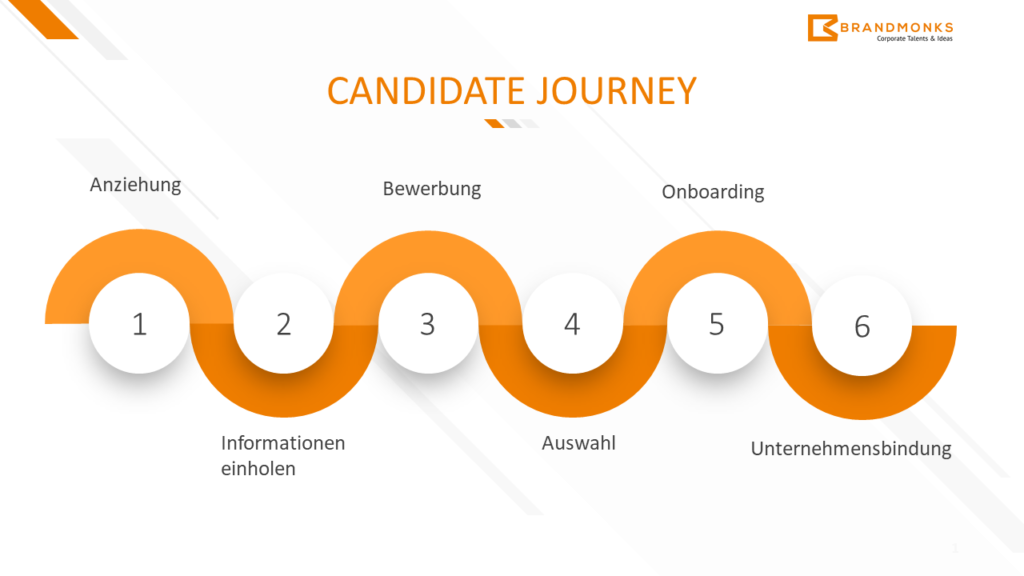Mit einer positiven Candidate Experience stärken Sie Ihre Employer Brand und halten potenzielle Kandidaten im Bewerbungsverfahren. Lesen Sie hier, wie Sie für positive Bewerbererlebnisse sorgen.

Viele Bewerber empfinden Jobsuche und Bewerbungsprozesse als nervenaufreibend. Mit einer ansprechenden Candidate Experience steuern Unternehmen dem entgegen.
Mehr noch: Im „War for Talents“ kann die Bewerbererfahrung darüber entscheiden, ob man einen Kandidaten von sich überzeugt oder an den Wettbewerb verliert.
Wir zeigen Ihnen im Folgenden, worauf es bei der Candidate Experience ankommt und wie Sie diese verbessern können – mit Beispielen, Tipps und einer Checkliste zum Herunterladen.

Per Definition versteht man unter der Candidate Experience die Summe der Wahrnehmungen und Erfahrungen, die ein Kandidat während der Bewerbungsphasen mit einem Unternehmen sammelt.
Der beschrittene Weg, wenn der Kandidat sich beim Unternehmen bewirbt, wird als Candidate Journey bezeichnet und umfasst die Reise vom ersten Kontakt bis zum Onboarding.
Candidate Experience und Candidate Journey können nicht voneinander getrennt betrachtet werden: Auf seiner Reise (Candidate Journey) sammelt der Bewerber verschiedene Erfahrungen (Candidate Experience) mit dem Unternehmen.
Der EMEA Candidate Experience Research Report 2019 von Talent Board analysiert Verhalten und Erwartungshaltung von Kandidaten bezüglich des Bewerbungsprozesses bei einem Unternehmen. Die Studie basiert auf den Angaben von über 13.000 Jobsuchenden.
Wir haben 3 wichtige Erkenntnisse aus dem Report zusammengefasst, die aufzeigen, warum positive Bewerbererlebnisse so bedeutsam sind:
Der Report enthält viele weitere Erkenntnisse darüber, was Kandidaten vom Bewerbungsprozess erwarten. Sie können die komplette Studie hier downloaden.
Das Candidate Experience Management sorgt beim Kandidaten an so vielen Touchpoints wie möglich für positive Erlebnisse mit dem Unternehmen.
Egal ob schriftlich, am Telefon oder im persönlichen Face-to-Face-Gespräch – es geht darum, dass man den Kandidaten im Bewerbungsverfahren hält und ein positives Unternehmensimage aufbaut und pflegt. Dadurch behält der Bewerber die Organisation auch dann positiv in Erinnerung, wenn es nicht zur Einstellung kommt.
Im War for Talents kann man sich durch eine positive Candidate Experience überdies einen entscheidenden Vorteil verschaffen: Mit einem besonders professionellen, wertschätzenden und freundlichen Umgang mit den Bewerbern können sich Unternehmen in ihrer Rolle als Arbeitgeber von ihren Wettbewerbern abheben.
Eine positive Candidate Experience unterscheidet sich von einer negativen Kandidatenerfahrung vor allem durch diese Merkmale:

Während eine überzeugende Candidate Experience beim Kandidat für positive Assoziationen mit dem Unternehmen sorgt, erzeugen schlechte Erfahrungen ein negatives Bild.
Die Negativ-Erlebnisse können der Arbeitgebermarke mit Blick auf das oben erwähnte Ergebnis der Talent Board-Studie enorm schaden. Kandidaten, die sich im Bewerbungsprozess unwürdig behandelt fühlen, könnten ihre Negativ-Erfahrungen mit anderen Menschen teilen und ihren Frust auf Arbeitgeber-Bewertungsportalen wie Kununu und Co. rauslassen.

Die für Kandidaten erlebbare Arbeitgebermarke kann in 6 Phasen gegliedert werden. Den folgenden Prozess kann ein (potenzieller) Bewerber durchlaufen und dabei auf verschiedene Kontaktpunkte mit dem Unternehmen stoßen.
1. Anziehung
Der erste Kontakt zwischen potenziellem Bewerber und Unternehmen entsteht meist während der Jobrecherche oder Berufsorientierung. Der Kandidat wird bspw. auf einer Jobmesse, im Rahmen einer Werbekampagne in Sozialen Medien oder durch die Empfehlung von Bekannten auf das Unternehmen aufmerksam.
Das Erlebnis sollte den Kandidaten so begeistern, dass er „mehr“ über den noch unbekannten, potenziellen Arbeitgeber erfahren möchte.
2. Informationen einholen
In dieser Phase holt der Kandidat sich weitere Informationen über das Unternehmen ein – bspw. auf dessen (Karriere-)Website, Social Media-Kanälen oder Kununu-Profil. Die Web-Auftritte, die dort auffindbaren Informationen und Stellenanzeigen sollten professionell aufbereitet sein und den positiven Ersteindruck bestätigen.
3. Bewerbung

Der Kandidat nimmt den Bewerbungsprozess auf. Die dafür bereitgestellten Web-Formulare, Upload-Optionen, Möglichkeiten zur Profilerstellung etc. sollten reibungslos funktionieren und selbsterklärend sein. Auf E-Mail-Bewerbungen sollten freundlich formulierte Bestätigungsmails versandt werden, aus denen auch hervorgeht, bis wann der Kandidat mit einer weiteren Rückmeldung rechnen kann.
4. Auswahl
Erhält der Bewerber eine Einladung zum Vorstellungsgespräch, kann man ihn bspw. durch Infovideos und Hilfetexte zum Bewerbungsprozess bereits im Vorhinein auf das Interview vorbereiten. Die Unterhaltung mit dem persönlichen Ansprechpartner sollte von Sachlichkeit, Wertschätzung und Fairness geprägt sein. In der Auswahlphase sammelt der Kandidat seine erste reale Erfahrung mit dem Unternehmen bzw. mit einem oder mehrerer seiner Repräsentanten.
5. Onboarding
Hat der Bewerber die Auswahl erfolgreich durchlaufen, wird er schließlich eingestellt. Nun geht es für das Unternehmen darum, den bislang erzeugten, positiven Eindruck beim Kandidaten zu bestätigen und untermauern. Durch einen gut organisierten Onboarding-Prozess kann der neue Kollege richtig eingearbeitet werden und dabei jederzeit Unterstützung erhalten.
6. Unternehmensbindung
In der letzten Phase geht es um die Bindung des Bewerbers, der nun als Angestellter den Unternehmensalltag erlebt. Es geht also darum, dass die positive Candidate Experience in eine positive Employee Experience übergeht. Gerade in der Anfangsphase könnte der neue Mitarbeiter sich nicht ausreichend integriert fühlen und das Unternehmen frühzeitig wieder verlassen. Entsprechend sollte geprüft werden, ob die Onboarding-Phase erfolgreich durchlaufen wurde.
Zwischen Kandidat und Unternehmen gibt es wie bereits erwähnt vor, während und nach dem Bewerbungsprozess verschiedenste Berührungspunkte. Wir haben eine Übersicht möglicher Touchpoints zusammengestellt.
Vor der Bewerbungsphase:
Während der Bewerbungsphase:
Nach der Bewerbungsphase:
Jede Bewerbungsphase hat also ihre eigenen, speziellen Touchpoints. Im Idealfall „reist“ der Kandidat auf seiner Candidate Journey von einem positiven Kontaktpunkt zum nächsten – bis zur letzten Phase.
Natürlich gibt es nicht den „einen“ richtigen Weg, mit dem Sie Ihre Candidate Experience optimieren können. Bei jedem Unternehmen muss die Verbesserung bestimmter Touchpoints im Bewerbungsprozess anders angegangen werden.
Dennoch gibt es ein paar grundlegende Tipps, die als Wegweiser zum Verbessern der Candidate Experience dienen:
Transparenz: Geben Sie authentische Einblicke (bspw. auf der Karriereseite) in Ihr Unternehmen und die ausgeschriebene Stelle und schaffen Sie so Vertrauen.

Einfachheit: Ermöglichen Sie Ihren Kandidaten eine unkomplizierte Bewerbung, die mit wenigen Klicks erledigt ist. Eine Möglichkeit ist bspw., dass sie ein Linkedin-Profil angeben und sich so das Eintippen diverser Informationen sparen.
Schnelligkeit: Antworten Sie zügig auf Bewerbungen. Nichts ist frustrierender, als nach 2 Monaten immer noch keine Rückmeldung zu bekommen.
Rückmeldung: Auch wenn Sie einem Kandidaten absagen müssen, so sollte eine zeitnahe (!) Rückmeldung selbstverständlich sein. Hier kann man trotz der negativen Nachricht ggf. mit passender Tonalität und Individualität punkten – auch Absagen können eine Chance für Personalmarketing sein.
Kontakt bis zum Onboarding: Zwischen einer Zusage und dem ersten Arbeitstag können mitunter Wochen oder sogar Monate verstreichen. Halten Sie in dieser Zeit regelmäßigen Kontakt zu Ihrem neuen Mitarbeiter.
Es wird deutlich, dass es für Unternehmen zahlreiche Möglichkeiten, aber auch Herausforderungen gibt, die Candidate Experience positiv zu beeinflussen.
Natürlich gibt es Faktoren, die nicht beeinflusst werden können. So zum Beispiel die Identifikation mit den Produkten und Dienstleistungen des Unternehmens. Ein überzeugter Veganer wird sich eher nicht um eine Stelle bei einem Zulieferer der Fleischindustrie bemühen.
Aber: Bei geeigneten, potenziellen Bewerbern kann ein organisiertes Candidate Experience Management mit gezielten Maßnahmen für eine positive Wahrnehmung sorgen. Von der individuellen Kommunikation auf Augenhöhe über zeitnahe Reaktionen bis zu ehrlichem Feedback im Falle einer Absage sowie unterstützenden Onboarding-Maßnahmen bei einer Zusage.
Hier finden Sie Antworten auf häufig gestellte Fragen rund um das Thema Candidate Experience.
Der Begriff wird häufig mit Bewerbererlebnis oder Bewerbererfahrung übersetzt. Im deutschprachigen Raum wird das englische Wort jedoch deutlich häufiger verwendet.
Es handelt sich um die genaue Planung von Maßnahmen, mit denen das Kandidatenerlebnis optimiert werden kann. Verschiedene Szenarien werden durchgespielt und getestet. Außerdem erfolgt eine fortlaufende Optimierung – erfolgreiche Maßnahmen werden ausgeweitet, weniger erfolgreiche werden verbessert oder über Bord geworfen.
Zur Messung des Bewerbererlebnisses gibt es verschiedene Methoden, aus denen sich Entscheidungen zur Optimierung ableiten lassen. Eine bekannte und einfache Methode ist der Net Promoter Score: Dabei stuft der Bewerber auf einer Skala von 0 (=auf keinen Fall) bis 10 (=sehr wahrscheinlich) ein, mit welcher Wahrscheinlichkeit er das Unternehmen seinem Bekanntenkreis weiterempfehlen würde.
Weitere Candidate Experience KPIs lassen sich etwa mit dem Customer Effort Score ermitteln. Entlang der Candidate Journey kann er an verschiedenen Touchpoints zum Einsatz kommen: Es handelt sich um Fragen, die den Aufwand eines Kandidaten ermitteln, den er zur Lösung eines bestimmten Problems betreiben muss. So zum Beispiel beim Touchpoint Website -> Wie hoch ist der Aufwand, um die Career Page zu finden?

Verschiedene bekannte Unternehmen setzen auf die Optimierung der Kandidatenerfahrung. Zum Beispiel McDonalds Deutschland: Mit einem Job Day veranstaltete der Fast Food-Riese ein Recruiting-Event, bei dem die Positionierung als guter Arbeitgeber durch persönliches Erleben in den teilnehmenden Restaurants im Vordergrund stand.
Ein anderes Beispiel ist die „Zappos Community“ des US-Versandhändlers Zappos. Da die Absprungrate auf der Career Page des Unternehmens enorm hoch war, änderte es seine recruiting strategy?. Es schaffte die Karriereseite ab und ersetzte sie durch ein soziales Netzwerk für Bewerber, das Austausch zwischen Recruitern und Kandidaten ermöglicht. Auch wenn aktuell keine passende Stelle vorhanden ist, können die Mitglieder dort bereits kennengelernt und zu einem späteren Zeitpunkt, wenn sich eine Vakanz ergibt, direkt zum Interview eingeladen werden.
Beim Employer
Branding geht es darum, ein Unternehmen als attraktiven Arbeitgeber zu präsentieren. Insofern hängt diese Maßnahme unmittelbar mit der Candidate Experience zusammen: Durch eine Bewerber-freundliche Gestaltung des Bewerbungsprozesses wird die Attraktivität des Unternehmens als Arbeitgeber gesteigert.
Je nach Generation, die erreicht werden soll, kann sich die Candidate Experience unterscheiden. Ein Beispiel: Für die Generation Baby Boomer gilt es auf der Karriereseite Optionen für Telefon- und E-Mail-Kontakt einzurichten, da diese Generation diese Kommunikationswege häufig bevorzugt. Möchte man dagegen die Generation Y, also Digital Natives erreichen, sollte man auch Kontaktmöglichkeiten via Social Media oder Videochat miteinrichten.
Haben Sie weitere Fragen zum Thema Candidate Experience? Nehmen Sie gerne Contact zu uns auf oder stellen Sie Ihre Frage im Kommentarfeld.
(Quelle Titelbild: fizkes – Shutterstock.com)